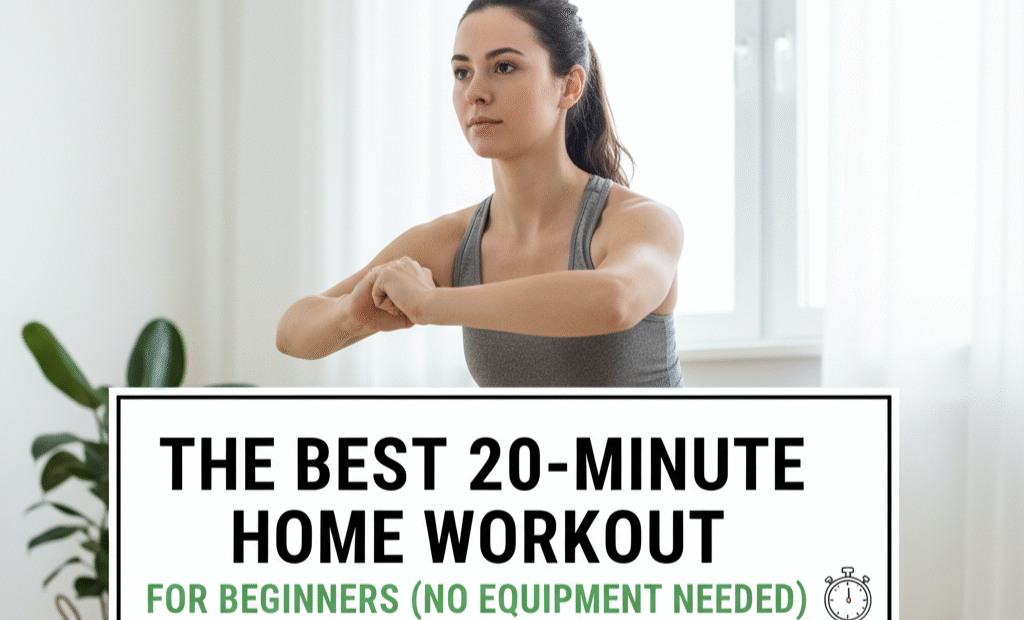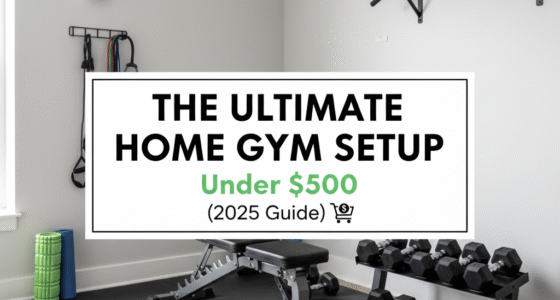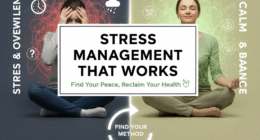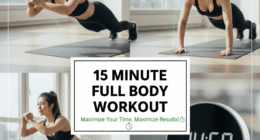Starting a fitness journey doesn’t have to be complicated or expensive. Many beginners believe they need a gym membership, heavy weights, or fancy equipment to get results. The truth is—you can get a full-body, calorie-burning, and strength-building workout from the comfort of your home in as little as 20 minutes. This no-equipment beginner workout will help you build consistency, improve fitness, and gain confidence.
Why a 20-Minute Home Workout Works
A short, structured workout can deliver impressive results if you stay consistent. Research shows that high-intensity bodyweight training helps improve cardiovascular health, burn fat, and strengthen muscles in less time. A 20-minute workout is:
- Time-efficient: Easy to fit into a busy schedule.
- Beginner-friendly: Uses simple movements anyone can do.
- Equipment-free: Relies on bodyweight, no gym required.
- Customizable: Can be modified based on your fitness level.
Warm-Up (3 Minutes)
Always begin with a warm-up to prepare your muscles and joints, reduce injury risk, and improve performance.
- March in place – 30 seconds
- Arm circles – 30 seconds
- Torso twists – 30 seconds
- High knees (slow pace) – 30 seconds
- Bodyweight squats – 30 seconds
- Shoulder rolls – 30 seconds
The 20-Minute Beginner Home Workout
This workout includes **five simple exercises** targeting all major muscle groups. Perform each move for **40 seconds**, rest for **20 seconds**, and complete 3–4 rounds depending on your fitness level.
1. Squats
Muscles worked: Quads, hamstrings, glutes, and core.
How to: Stand with feet shoulder-width apart, lower your body as if sitting on a chair, then push back up.
Beginner tip: Keep your chest up and don’t let your knees go past your toes.
2. Push-Ups (Modified if Needed)
Muscles worked: Chest, shoulders, triceps, and core.
How to: Start in a plank position, lower your chest toward the ground, then push back up.
Beginner tip: If regular push-ups are too difficult, drop your knees to the floor.
3. Glute Bridges
Muscles worked: Glutes, hamstrings, and lower back.
How to: Lie on your back, bend your knees, and lift your hips toward the ceiling. Hold for 2 seconds, then lower.
Beginner tip: Squeeze your glutes at the top for better activation.
4. Plank Hold
Muscles worked: Core, shoulders, and back.
How to: Rest on your forearms and toes, keeping your body in a straight line. Hold the position.
Beginner tip: Drop your knees if holding a full plank is too challenging.
5. Jumping Jacks
Muscles worked: Full body, especially legs and cardiovascular system.
How to: Jump feet apart while raising arms overhead, then return to starting position.
Beginner tip: Step side-to-side instead of jumping if you need a low-impact option.
Cool-Down and Stretching (3–5 Minutes)
After the workout, take time to cool down and stretch. This helps reduce soreness and improve flexibility.
- Forward fold stretch – 30 seconds
- Seated hamstring stretch – 30 seconds each leg
- Child’s pose – 1 minute
- Shoulder stretch – 30 seconds each side
- Cat-cow stretch – 1 minute
Weekly Workout Schedule for Beginners
Consistency matters more than intensity in the beginning. Here’s a suggested plan:
- Day 1: 20-minute home workout
- Day 2: Light cardio (walking, jogging, cycling)
- Day 3: Rest or yoga
- Day 4: 20-minute home workout
- Day 5: Core-focused exercises or stretching
- Day 6: 20-minute home workout
- Day 7: Rest
Nutrition Tips to Support Your Workout
Exercise is just one part of the equation. To maximize results, pair your workouts with a balanced diet:
- Eat a protein-rich meal after workouts (beans, eggs, tofu, or lean meat).
- Stay hydrated throughout the day.
- Limit processed sugar and refined carbs.
- Prioritize whole foods like vegetables, fruits, legumes, and whole grains.
Benefits of This Workout Routine
- Improves cardiovascular endurance
- Strengthens major muscle groups
- Boosts metabolism and calorie burn
- Reduces stress and improves mood
- Helps build consistency in fitness habits
Common Mistakes Beginners Should Avoid
- Skipping warm-up and cool-down
- Doing exercises too fast with poor form
- Not resting enough between rounds
- Comparing progress with others
- Expecting instant results
Conclusion
This 20-minute beginner home workout proves that fitness doesn’t require fancy gyms or expensive equipment. With just your bodyweight and a little space, you can strengthen muscles, improve endurance, and build a sustainable routine. Start with consistency, focus on proper form, and gradually increase intensity. In just a few weeks, you’ll notice more energy, better strength, and improved confidence—all from the comfort of your home.









